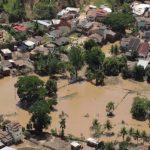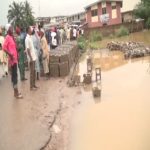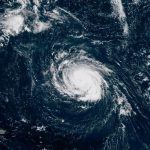Russia and Kazakhstan have ordered the evacuation of over 100,000 people after swiftly melting snow swollen mighty rivers beyond their capacity, causing the worst flooding in the region in at least 70 years.
According to the report, a deluge of meltwater flooded scores of villages in the Ural Mountains, Siberia, and Kazakhstan.
Local officials said that the meltwater had risen by metres in a matter of hours to its greatest levels ever recorded.
The Ural River, Europe’s third longest which flows through Russia and Kazakhstan into the Caspian, burst through an embankment dam on Friday, flooding the city of Orsk just south of the Ural Mountains.
Downstream, water levels in Orenburg, a city of around 550,000, rose towards the critical level of 9.3 metres as sirens warned major floods were imminent. The water level is currently 9.14 metres.
Sirens in Kurgan, a city on the Tobol River, a tributary of the Irtysh, alerted residents to escape immediately. An emergency has also been proclaimed in Tyumen, a significant oil-producing region in Western Siberia and the world’s largest hydrocarbon basin.
President Vladimir Putin met with Kazakhstan’s President Kassym-Jomart Tokayev, who had evacuated over 86,000 people due to flooding. Tokayev said the flooding was likely the worst in 80 years.
Meanwhile, the most seriously affected regions include Atyrau, Aktobe, Akmola, Kostanai, Eastern Kazakhstan, Northern Kazakhstan, and Pavlodar, the majority of which border Russia and are crossed by rivers that originate in Russia, such as the Ural and Tobol.
In Russia, anger boiled over in Orsk when at least 100 Russians begged the Kremlin chief to help and chanted “shame on you” at local officials who they said had done too little.
The Kremlin said Putin was getting updated constantly on the situation but that he had no immediate plans to visit the flood zone as local and emergency officials were doing their best to cope with the deluge.
In Kurgan, a region with around 800,000 residents, drone footage showed traditional Russian wooden houses and the golden kupolas of Russian Orthodox Churches stranded among a vast expanse of water.
In Orenburg, a city of more than half a million, residents paddled along roads as if they were rivers. Dams and embankments were being strengthened as the Ural River rose to nearly 10 metres high.
Russian officials have said some people ignored calls to evacuate. Kurgan Governor Vadim Shumkov urged residents to take the warnings seriously.
It was not immediately clear why this year’s floods were so bad as the snow melt is an annual event in Russia. Scientists say climate change has made flooding more frequent worldwide.
Russia and Kazakhstan have ordered the evacuation of over 100,000 people after swiftly melting snow swollen mighty rivers beyond their capacity, causing the worst flooding in the region in at least 70 years.
According to the report, a deluge of meltwater flooded scores of villages in the Ural Mountains, Siberia, and Kazakhstan.
Local officials said that the meltwater had risen by metres in a matter of hours to its greatest levels ever recorded.
The Ural River, Europe’s third longest which flows through Russia and Kazakhstan into the Caspian, burst through an embankment dam on Friday, flooding the city of Orsk just south of the Ural Mountains.
Downstream, water levels in Orenburg, a city of around 550,000, rose towards the critical level of 9.3 metres as sirens warned major floods were imminent. The water level is currently 9.14 metres.
Sirens in Kurgan, a city on the Tobol River, a tributary of the Irtysh, alerted residents to escape immediately. An emergency has also been proclaimed in Tyumen, a significant oil-producing region in Western Siberia and the world’s largest hydrocarbon basin.
President Vladimir Putin met with Kazakhstan’s President Kassym-Jomart Tokayev, who had evacuated over 86,000 people due to flooding. Tokayev said the flooding was likely the worst in 80 years.
Meanwhile, the most seriously affected regions include Atyrau, Aktobe, Akmola, Kostanai, Eastern Kazakhstan, Northern Kazakhstan, and Pavlodar, the majority of which border Russia and are crossed by rivers that originate in Russia, such as the Ural and Tobol.
In Russia, anger boiled over in Orsk when at least 100 Russians begged the Kremlin chief to help and chanted “shame on you” at local officials who they said had done too little.
The Kremlin said Putin was getting updated constantly on the situation but that he had no immediate plans to visit the flood zone as local and emergency officials were doing their best to cope with the deluge.
In Kurgan, a region with around 800,000 residents, drone footage showed traditional Russian wooden houses and the golden kupolas of Russian Orthodox Churches stranded among a vast expanse of water.
In Orenburg, a city of more than half a million, residents paddled along roads as if they were rivers. Dams and embankments were being strengthened as the Ural River rose to nearly 10 metres high.
Russian officials have said some people ignored calls to evacuate. Kurgan Governor Vadim Shumkov urged residents to take the warnings seriously.
It was not immediately clear why this year’s floods were so bad as the snow melt is an annual event in Russia. Scientists say climate change has made flooding more frequent worldwide.
Russia and Kazakhstan have ordered the evacuation of over 100,000 people after swiftly melting snow swollen mighty rivers beyond their capacity, causing the worst flooding in the region in at least 70 years.
According to the report, a deluge of meltwater flooded scores of villages in the Ural Mountains, Siberia, and Kazakhstan.
Local officials said that the meltwater had risen by metres in a matter of hours to its greatest levels ever recorded.
The Ural River, Europe’s third longest which flows through Russia and Kazakhstan into the Caspian, burst through an embankment dam on Friday, flooding the city of Orsk just south of the Ural Mountains.
Downstream, water levels in Orenburg, a city of around 550,000, rose towards the critical level of 9.3 metres as sirens warned major floods were imminent. The water level is currently 9.14 metres.
Sirens in Kurgan, a city on the Tobol River, a tributary of the Irtysh, alerted residents to escape immediately. An emergency has also been proclaimed in Tyumen, a significant oil-producing region in Western Siberia and the world’s largest hydrocarbon basin.
President Vladimir Putin met with Kazakhstan’s President Kassym-Jomart Tokayev, who had evacuated over 86,000 people due to flooding. Tokayev said the flooding was likely the worst in 80 years.
Meanwhile, the most seriously affected regions include Atyrau, Aktobe, Akmola, Kostanai, Eastern Kazakhstan, Northern Kazakhstan, and Pavlodar, the majority of which border Russia and are crossed by rivers that originate in Russia, such as the Ural and Tobol.
In Russia, anger boiled over in Orsk when at least 100 Russians begged the Kremlin chief to help and chanted “shame on you” at local officials who they said had done too little.
The Kremlin said Putin was getting updated constantly on the situation but that he had no immediate plans to visit the flood zone as local and emergency officials were doing their best to cope with the deluge.
In Kurgan, a region with around 800,000 residents, drone footage showed traditional Russian wooden houses and the golden kupolas of Russian Orthodox Churches stranded among a vast expanse of water.
In Orenburg, a city of more than half a million, residents paddled along roads as if they were rivers. Dams and embankments were being strengthened as the Ural River rose to nearly 10 metres high.
Russian officials have said some people ignored calls to evacuate. Kurgan Governor Vadim Shumkov urged residents to take the warnings seriously.
It was not immediately clear why this year’s floods were so bad as the snow melt is an annual event in Russia. Scientists say climate change has made flooding more frequent worldwide.
Russia and Kazakhstan have ordered the evacuation of over 100,000 people after swiftly melting snow swollen mighty rivers beyond their capacity, causing the worst flooding in the region in at least 70 years.
According to the report, a deluge of meltwater flooded scores of villages in the Ural Mountains, Siberia, and Kazakhstan.
Local officials said that the meltwater had risen by metres in a matter of hours to its greatest levels ever recorded.
The Ural River, Europe’s third longest which flows through Russia and Kazakhstan into the Caspian, burst through an embankment dam on Friday, flooding the city of Orsk just south of the Ural Mountains.
Downstream, water levels in Orenburg, a city of around 550,000, rose towards the critical level of 9.3 metres as sirens warned major floods were imminent. The water level is currently 9.14 metres.
Sirens in Kurgan, a city on the Tobol River, a tributary of the Irtysh, alerted residents to escape immediately. An emergency has also been proclaimed in Tyumen, a significant oil-producing region in Western Siberia and the world’s largest hydrocarbon basin.
President Vladimir Putin met with Kazakhstan’s President Kassym-Jomart Tokayev, who had evacuated over 86,000 people due to flooding. Tokayev said the flooding was likely the worst in 80 years.
Meanwhile, the most seriously affected regions include Atyrau, Aktobe, Akmola, Kostanai, Eastern Kazakhstan, Northern Kazakhstan, and Pavlodar, the majority of which border Russia and are crossed by rivers that originate in Russia, such as the Ural and Tobol.
In Russia, anger boiled over in Orsk when at least 100 Russians begged the Kremlin chief to help and chanted “shame on you” at local officials who they said had done too little.
The Kremlin said Putin was getting updated constantly on the situation but that he had no immediate plans to visit the flood zone as local and emergency officials were doing their best to cope with the deluge.
In Kurgan, a region with around 800,000 residents, drone footage showed traditional Russian wooden houses and the golden kupolas of Russian Orthodox Churches stranded among a vast expanse of water.
In Orenburg, a city of more than half a million, residents paddled along roads as if they were rivers. Dams and embankments were being strengthened as the Ural River rose to nearly 10 metres high.
Russian officials have said some people ignored calls to evacuate. Kurgan Governor Vadim Shumkov urged residents to take the warnings seriously.
It was not immediately clear why this year’s floods were so bad as the snow melt is an annual event in Russia. Scientists say climate change has made flooding more frequent worldwide.
Russia and Kazakhstan have ordered the evacuation of over 100,000 people after swiftly melting snow swollen mighty rivers beyond their capacity, causing the worst flooding in the region in at least 70 years.
According to the report, a deluge of meltwater flooded scores of villages in the Ural Mountains, Siberia, and Kazakhstan.
Local officials said that the meltwater had risen by metres in a matter of hours to its greatest levels ever recorded.
The Ural River, Europe’s third longest which flows through Russia and Kazakhstan into the Caspian, burst through an embankment dam on Friday, flooding the city of Orsk just south of the Ural Mountains.
Downstream, water levels in Orenburg, a city of around 550,000, rose towards the critical level of 9.3 metres as sirens warned major floods were imminent. The water level is currently 9.14 metres.
Sirens in Kurgan, a city on the Tobol River, a tributary of the Irtysh, alerted residents to escape immediately. An emergency has also been proclaimed in Tyumen, a significant oil-producing region in Western Siberia and the world’s largest hydrocarbon basin.
President Vladimir Putin met with Kazakhstan’s President Kassym-Jomart Tokayev, who had evacuated over 86,000 people due to flooding. Tokayev said the flooding was likely the worst in 80 years.
Meanwhile, the most seriously affected regions include Atyrau, Aktobe, Akmola, Kostanai, Eastern Kazakhstan, Northern Kazakhstan, and Pavlodar, the majority of which border Russia and are crossed by rivers that originate in Russia, such as the Ural and Tobol.
In Russia, anger boiled over in Orsk when at least 100 Russians begged the Kremlin chief to help and chanted “shame on you” at local officials who they said had done too little.
The Kremlin said Putin was getting updated constantly on the situation but that he had no immediate plans to visit the flood zone as local and emergency officials were doing their best to cope with the deluge.
In Kurgan, a region with around 800,000 residents, drone footage showed traditional Russian wooden houses and the golden kupolas of Russian Orthodox Churches stranded among a vast expanse of water.
In Orenburg, a city of more than half a million, residents paddled along roads as if they were rivers. Dams and embankments were being strengthened as the Ural River rose to nearly 10 metres high.
Russian officials have said some people ignored calls to evacuate. Kurgan Governor Vadim Shumkov urged residents to take the warnings seriously.
It was not immediately clear why this year’s floods were so bad as the snow melt is an annual event in Russia. Scientists say climate change has made flooding more frequent worldwide.
Russia and Kazakhstan have ordered the evacuation of over 100,000 people after swiftly melting snow swollen mighty rivers beyond their capacity, causing the worst flooding in the region in at least 70 years.
According to the report, a deluge of meltwater flooded scores of villages in the Ural Mountains, Siberia, and Kazakhstan.
Local officials said that the meltwater had risen by metres in a matter of hours to its greatest levels ever recorded.
The Ural River, Europe’s third longest which flows through Russia and Kazakhstan into the Caspian, burst through an embankment dam on Friday, flooding the city of Orsk just south of the Ural Mountains.
Downstream, water levels in Orenburg, a city of around 550,000, rose towards the critical level of 9.3 metres as sirens warned major floods were imminent. The water level is currently 9.14 metres.
Sirens in Kurgan, a city on the Tobol River, a tributary of the Irtysh, alerted residents to escape immediately. An emergency has also been proclaimed in Tyumen, a significant oil-producing region in Western Siberia and the world’s largest hydrocarbon basin.
President Vladimir Putin met with Kazakhstan’s President Kassym-Jomart Tokayev, who had evacuated over 86,000 people due to flooding. Tokayev said the flooding was likely the worst in 80 years.
Meanwhile, the most seriously affected regions include Atyrau, Aktobe, Akmola, Kostanai, Eastern Kazakhstan, Northern Kazakhstan, and Pavlodar, the majority of which border Russia and are crossed by rivers that originate in Russia, such as the Ural and Tobol.
In Russia, anger boiled over in Orsk when at least 100 Russians begged the Kremlin chief to help and chanted “shame on you” at local officials who they said had done too little.
The Kremlin said Putin was getting updated constantly on the situation but that he had no immediate plans to visit the flood zone as local and emergency officials were doing their best to cope with the deluge.
In Kurgan, a region with around 800,000 residents, drone footage showed traditional Russian wooden houses and the golden kupolas of Russian Orthodox Churches stranded among a vast expanse of water.
In Orenburg, a city of more than half a million, residents paddled along roads as if they were rivers. Dams and embankments were being strengthened as the Ural River rose to nearly 10 metres high.
Russian officials have said some people ignored calls to evacuate. Kurgan Governor Vadim Shumkov urged residents to take the warnings seriously.
It was not immediately clear why this year’s floods were so bad as the snow melt is an annual event in Russia. Scientists say climate change has made flooding more frequent worldwide.
Russia and Kazakhstan have ordered the evacuation of over 100,000 people after swiftly melting snow swollen mighty rivers beyond their capacity, causing the worst flooding in the region in at least 70 years.
According to the report, a deluge of meltwater flooded scores of villages in the Ural Mountains, Siberia, and Kazakhstan.
Local officials said that the meltwater had risen by metres in a matter of hours to its greatest levels ever recorded.
The Ural River, Europe’s third longest which flows through Russia and Kazakhstan into the Caspian, burst through an embankment dam on Friday, flooding the city of Orsk just south of the Ural Mountains.
Downstream, water levels in Orenburg, a city of around 550,000, rose towards the critical level of 9.3 metres as sirens warned major floods were imminent. The water level is currently 9.14 metres.
Sirens in Kurgan, a city on the Tobol River, a tributary of the Irtysh, alerted residents to escape immediately. An emergency has also been proclaimed in Tyumen, a significant oil-producing region in Western Siberia and the world’s largest hydrocarbon basin.
President Vladimir Putin met with Kazakhstan’s President Kassym-Jomart Tokayev, who had evacuated over 86,000 people due to flooding. Tokayev said the flooding was likely the worst in 80 years.
Meanwhile, the most seriously affected regions include Atyrau, Aktobe, Akmola, Kostanai, Eastern Kazakhstan, Northern Kazakhstan, and Pavlodar, the majority of which border Russia and are crossed by rivers that originate in Russia, such as the Ural and Tobol.
In Russia, anger boiled over in Orsk when at least 100 Russians begged the Kremlin chief to help and chanted “shame on you” at local officials who they said had done too little.
The Kremlin said Putin was getting updated constantly on the situation but that he had no immediate plans to visit the flood zone as local and emergency officials were doing their best to cope with the deluge.
In Kurgan, a region with around 800,000 residents, drone footage showed traditional Russian wooden houses and the golden kupolas of Russian Orthodox Churches stranded among a vast expanse of water.
In Orenburg, a city of more than half a million, residents paddled along roads as if they were rivers. Dams and embankments were being strengthened as the Ural River rose to nearly 10 metres high.
Russian officials have said some people ignored calls to evacuate. Kurgan Governor Vadim Shumkov urged residents to take the warnings seriously.
It was not immediately clear why this year’s floods were so bad as the snow melt is an annual event in Russia. Scientists say climate change has made flooding more frequent worldwide.
Russia and Kazakhstan have ordered the evacuation of over 100,000 people after swiftly melting snow swollen mighty rivers beyond their capacity, causing the worst flooding in the region in at least 70 years.
According to the report, a deluge of meltwater flooded scores of villages in the Ural Mountains, Siberia, and Kazakhstan.
Local officials said that the meltwater had risen by metres in a matter of hours to its greatest levels ever recorded.
The Ural River, Europe’s third longest which flows through Russia and Kazakhstan into the Caspian, burst through an embankment dam on Friday, flooding the city of Orsk just south of the Ural Mountains.
Downstream, water levels in Orenburg, a city of around 550,000, rose towards the critical level of 9.3 metres as sirens warned major floods were imminent. The water level is currently 9.14 metres.
Sirens in Kurgan, a city on the Tobol River, a tributary of the Irtysh, alerted residents to escape immediately. An emergency has also been proclaimed in Tyumen, a significant oil-producing region in Western Siberia and the world’s largest hydrocarbon basin.
President Vladimir Putin met with Kazakhstan’s President Kassym-Jomart Tokayev, who had evacuated over 86,000 people due to flooding. Tokayev said the flooding was likely the worst in 80 years.
Meanwhile, the most seriously affected regions include Atyrau, Aktobe, Akmola, Kostanai, Eastern Kazakhstan, Northern Kazakhstan, and Pavlodar, the majority of which border Russia and are crossed by rivers that originate in Russia, such as the Ural and Tobol.
In Russia, anger boiled over in Orsk when at least 100 Russians begged the Kremlin chief to help and chanted “shame on you” at local officials who they said had done too little.
The Kremlin said Putin was getting updated constantly on the situation but that he had no immediate plans to visit the flood zone as local and emergency officials were doing their best to cope with the deluge.
In Kurgan, a region with around 800,000 residents, drone footage showed traditional Russian wooden houses and the golden kupolas of Russian Orthodox Churches stranded among a vast expanse of water.
In Orenburg, a city of more than half a million, residents paddled along roads as if they were rivers. Dams and embankments were being strengthened as the Ural River rose to nearly 10 metres high.
Russian officials have said some people ignored calls to evacuate. Kurgan Governor Vadim Shumkov urged residents to take the warnings seriously.
It was not immediately clear why this year’s floods were so bad as the snow melt is an annual event in Russia. Scientists say climate change has made flooding more frequent worldwide.














